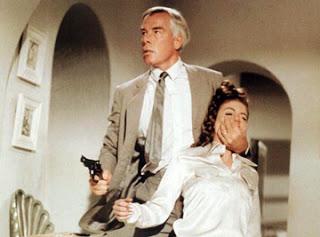
"Somebody's got to pay!"
John Boorman's Point Blank (1967) was overshadowed Bonnie and Clyde, The Graduate and other game-changing "New Hollywood" features. In its own way, Boorman's Hollywood debut is equally audacious, grafting highbrow aesthetics onto a standard crime caper.Walker (Lee Marvin) is shot and left for dead during a robbery on Alcatraz Island. His treacherous partner Mal Reese (John Vernon) has a fling with Walker's suicidal wife Lynne (Sharon Acker) and becomes a big shot in organized crime. Helped by sister-in-law Chris (Angie Dickinson) and Yost (Keenan Wynn), an informant with selfish motives, Walker takes revenge on Reese and his outfit, hoping to track down his $93,000 share.
Point Blank has the bones of a dozen pulp novels but the texture of Michaelangelo Antonioni. Boorman pares Alexander Jacob's script down to bare essentials, offering minimal dialog and sparse explanation. Boorman uses shock cuts to inject backstory, replaying conversations and killings repeatedly while jumping across time; an early scene cuts between Walker swimming through San Francisco Bay and a well-dressed Walker months later on a ferry. Johnny Mandel's eerie score battles with a strange soundscape of chattering announcements, classical music and whirring appliances.
Even Jean-Pierre Melville's Le Samourai, released the same year, lacks Boorman's hardboiled flash. Phillip H. Lathrop's roving camera alternates shadowy long shots with expressive set-ups: characters appear in broken mirrors, Walker's framed through a window screen, a bathtub fills with swirling soap. Walker fends off goons at a nightclub where they battle before a pornographic show, toppling film canisters on each other. Every interior is jarring monochrome, with Walker and Chris sporting attire to match Chris's beige apartment or Reese's lurid, red hangout.
This heightened reality leads many critics to brand Point Blank an Ambrose Bierce-style dying dream, or Walker a supernatural avenger like High Plains Drifter. This explains Walker's uncanny craftiness, slipping into Reese's hotel past a dozen armed guards, the constant flashbacks and jarring elisions. Or his implacability, when he lets Chris beat him until she collapses from exhaustion. He's more often a witness to murder, stumbling into a mob war. This extends to the finale, where he allows a payoff to become an elaborate execution.
Lee Marvin fits Walker snugly; he's able to carry the picture with stoicism and calm, detached menace. Angie Dickinson makes a tough, engaging partner in crime. Sharon Acker delivers a heartbreaking monolog that provides Point Blank a human center. John Vernon makes a savage villain, with his colleagues contributing assorted notes of menace: businesslike Lloyd Bechner, wheedling Carrol O'Connor, inscrutable Keenan Wynn.
Sometimes Point Blank seems like an ordinary thriller with banal Los Angeles locations. Every time we're settling into a groove, Boorman throws us a distorted image, a shocking murder or fractured flashback to unnerve us. It's the mark of an ambitious filmmaker and an excellent movie.

